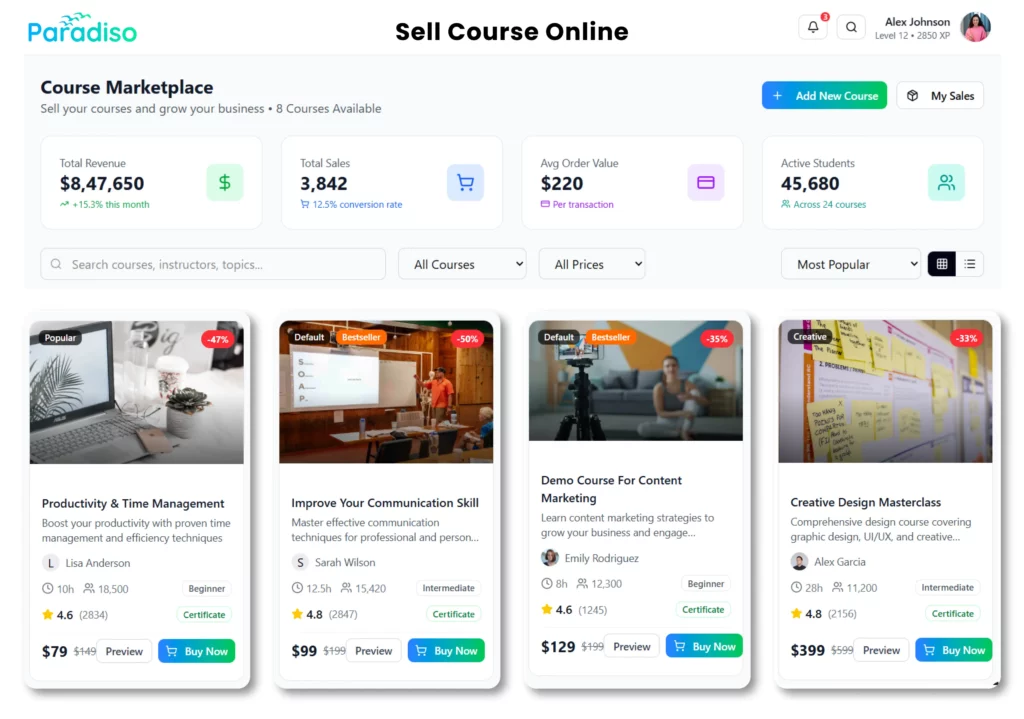The e-learning market has grown significantly in recent years as more and more people have turned to online platforms to access educational content. There are many benefits to e-learning, including learning at one’s own pace, access to a wide range of course materials, and the convenience of learning from any location.
Edupreneurs, or education entrepreneurs, use the e-learning market to create and sell educational courses. These products and services can include online courses, educational software, tutoring services, and more. Edupreneurs can reach a global audience through the Internet, and many have built successful businesses in the e-learning market.
The e-learning market offers many opportunities for edupreneurs to create and sell educational products and services. With the continued growth of the internet and the increasing popularity of online learning, the e-learning market is expected to expand in the coming years. This write-up will discuss the online course launch checklist to ensure your course is ready to reach your potential users.
There are several benefits for edupreneurs who create online courses:
- Reach a global audience: By creating an online course, edupreneurs can reach students worldwide rather than being limited to a specific geographical location.
- Greater flexibility: Online courses allow edupreneurs to work on their schedule and from any location. This can be particularly appealing to those who value flexibility and the ability to work from home.
- Multiple income streams: Edupreneurs can create numerous courses and sell them on various platforms, providing multiple income streams.
- Low start-up costs: Creating an online course has relatively low start-up costs. This makes it a potentially more accessible option for those looking to start their own business.
- User management: Online courses typically have many students, and it can be challenging to manage and communicate with them all effectively. It is important to have a system for answering student questions and providing support.
- Course management: Online courses often involve a large number of course materials, such as video lectures, readings, and assignments. It is important to have a system in place for organizing and managing these materials and tracking student progress.
- Geographical flexibility: One of the benefits of online courses is the ability to reach students from any location. This can be challenging to manage a diverse group of students with different time zones and cultural backgrounds. It is important to be mindful of these differences and to provide support and accommodations as needed.
- Reduced paperwork: Online courses typically do not require physical materials. Instead, course materials are often provided electronically, such as through video lectures, PDF readings, and online assignments. This means that edupreneurs can create and teach an online course without incurring the costs associated with physical materials. No additional paperwork is required for student registration, and assignment submission and grading can all be done electronically, eliminating the need to use paper.
Creating an online course can be a lucrative and flexible business opportunity for edupreneurs. By leveraging the power of the internet and the growing demand for online learning, edupreneurs can create and sell educational products and services to a global audience. However, you require a course launch checklist to ensure everything is well planned and executed.
Online course creation checklist:
- Identify your target audience: Who do you want to create the course for? Consider the age, experience level, and interests of your potential students.
- Determine the value of your course: What problem or need will your course address? How will it benefit your students?
- Choose a topic: Select a topic that is relevant to your target audience and that you are knowledgeable and passionate about.
- Research the market: Determine if there is a demand for a course on your chosen topic. Look for similar courses and see what makes your course unique.
- Outline the course: Organize your course into logical sections and determine what materials and activities you will include.
- Determine the format: Will your course be self-paced or have a set schedule? Will it be video-based or include text-based materials?
- Consider your target market: Where will you sell your course? Will you use a third-party platform or create your website?
- Create a marketing plan: Determine how you will promote your course to potential students.
Following these steps can create a solid foundation for your online course idea.
So, where to launch your online course?
You can launch your online course on several platforms, including Paradiso LMS. Paradiso LMS is an online platform that allows you to create, sell, and host courses.
Paradiso eCommerce LMS is an online platform offering various benefits for those looking to launch an online course.
Below are the benefits of using Paradiso LMS:
- Ease of use: Paradiso LMS is user-friendly and offers a range of tools to help you create and launch your course.
- Customization options: You can customize the look and feel of your course to match your brand and style.
- Payment processing: Paradiso LMS handles payment processing, making accepting payments for your course easy.
- Student management: The platform includes tools for managing your students, including assignment submission and grading.
- Marketing and promotion: It provides marketing and promotion tools to help you reach potential students.
Final Thoughts:
Making the course creation checklist is essential to take the time to carefully plan and prepare for the launch, as this will help ensure the course’s success. Following these tips can launch a successful and valuable online course.













